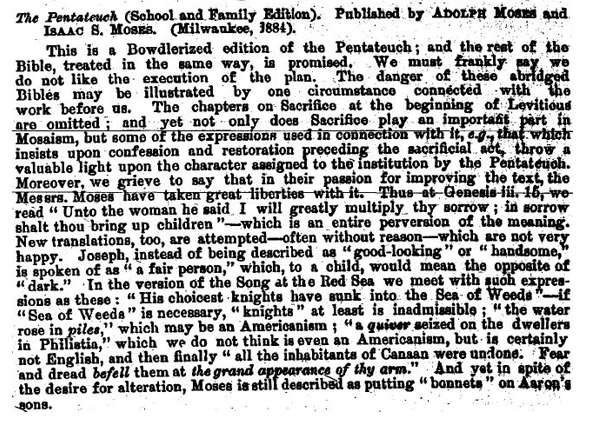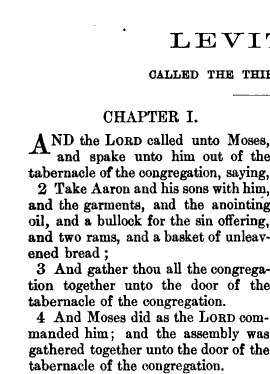A review in the Jewish Chronicle called it "bowdlerized" and made fun of its Americanisms.

It's first serious criticism is that this translation omitted the very long section on sacrifices at the beginning of Leviticus! In its understated British way the reviewer notes that not only are sacrifices important in Mosaism, but these chapters contain a lot of important theology concerning confession and atonement. The review did not say how much is missing, but as you can see below, it goes from the first verse in Leviticus, skips seven chapters and resumes with the first verse of Leviticus 8, as if this is the second verse, first chapter, without noting anything is missing:

The review also questions the presence of knights cast into the sea in the Shirat Ha-yam (Song of the Sea; Exodus 15):

and makes fun of Americanisms, at one point suggesting that something in the translation probably isn't even Americanism (how lowbrow can one get?) - but isn't even English.
It also singled out the fact that the Moses Pentateuch speaks of the Sea of Weeds. At first I thought this was hilarious. A typo? Bad pronunciation for Sea of Reeds? Hilarious. But then I did a little digging and learned something new. In the 19th century, recognizing finally that Hebrew Yam Suf does not mean "the Red Sea" (for that we have to thank the Septuagint, but see here where I suggested that the Septuagint was not trying to identify the sea). Today we tend to say "Reed Sea" or "Sea of Reeds" - the former conforms more nicely to the traditional "Red Sea," in my opinion. Yet in the 19th century the translation for Suf was often Weed or Weedy. Thus, many wrote of the Sea of Weeds of the Weedy Sea.
Frankly, I think that's hilarious.
Incidentally, the Artscroll translates "Sea of Reeds," Mendelssohn translated בינזעןזעע, and Luther translated "Schilfmeer," which all mean the same thing.





My favourite strange translation is from Coverdale's Bible of 1535, which translated Jeremiah 8.22 as "Is there no treacle in Gilead?"
ReplyDeleteAt first I thought this was hilarious. A typo?
If you want more of this kind of thing, Brewer's Dictionary of Phrase and Fable has a long list of Bibles with unfortunate typos, as does Wikipedia.
The image of my Kohen ancestors decked out in "bonnets" like a bunch of pioneer women is especially appealing to me.
ReplyDelete